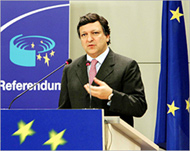EU future in doubt after Dutch ‘no’
European leaders have said the Dutch rejection of the European Union constitution raises major questions about the future of Europe.

The no vote on Wednesday comes after France rejected the constitution on Sunday.
In a statement following the Dutch referendum result, French President Jacques Chirac said: “This new negative result in a founding member of the union and committed to European construction shows strong expectations, questions and concerns about the development of the European project.”
British Foreign Minister Jack Straw also said the Dutch result raised profound questions for the 25-member bloc and that the results should be respected.
“The verdict of these (Dutch and French) referendums now raises profound questions for all of us about the future direction of Europe,” Straw said in a statement.
He did not say whether Britain still planned to hold a referendum.
Ratification process
Nevertheless, EU leaders urged member nations not to halt the ratification process for the bloc’s constitution before a mid-June summit assesses the devastating results of French and Dutch referendums.
“We have a serious problem, but we must continue our work,” Commission President Jose Manuel Barroso said on Wednesday, adding he would ask the 16-17 June meeting of government leaders for “clarification” on the way ahead.
|
“This new negative result in a founding member of the union and committed to European construction shows strong expectations, questions and concerns about the development of the European project” Jacques Chirac, |
“We hear the message sent by the French and Dutch citizens on the European project and will take this into account,” the leaders of the EU head office, the council of 25 member states and the legislature said in a joint statement.
The summit “should undertake a thorough collective analysis of the situation”, it said.
“I will ask member states to avoid any unilateral initiatives before the summit,” Barroso said even before the resounding defeat in the Dutch referendum was known.
Nearly 55% of French voters rejected the constitution in a referendum on Sunday.
Challenges ahead
“We need to know where we’re going,” Barroso said. “I hope the heads of state and government will give a clear signal about the future of the European Union.”
Luxembourg Prime Minister Jean-Claude Juncker, who holds the EU presidency, warned of the challenges ahead.
 |
|
Jose Manuel Barroso admits the |
“This is a dangerous position to be in. We need to show the outside world that we are sticking to the path of a better future,” he said.
The summit was originally expected to focus on the EU’s budget for 2007-2013 and getting a deal on the financial contributions, and to show a united front becomes all the more important, he said.
“Now more than ever we are obliged to reach a deal on the financial perspectives,” said Juncker.
Some European parliamentarians also doubted the full ratification in all 25 member states would run its course.
EU presidency
“We have a clause in the constitution that says we will look at the results once the voting is finished, but I don’t known whether we will,” said German Conservative Elmar Brok, chairman of the assembly foreign affairs committee.
“It is now up to the European heads of government to come forward with a proposal for tackling the institutional issues which the constitution is intended to resolve,” added Poul Nyrup Rasmussen, president of the European Socialist parties.
Juncker has started bilateral meetings with EU leaders, with the treaty high on the agenda.
Britain is taking over the EU presidency in July and will have to chair the debate on the constitution in the following six months.